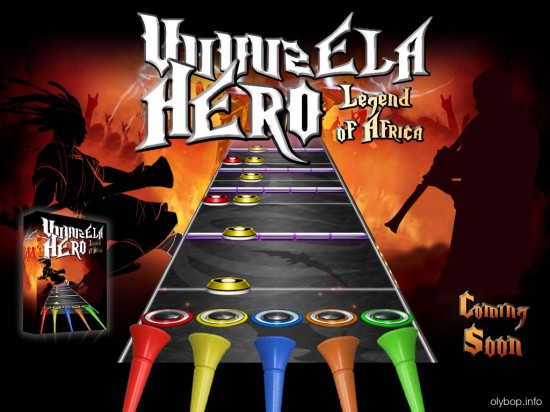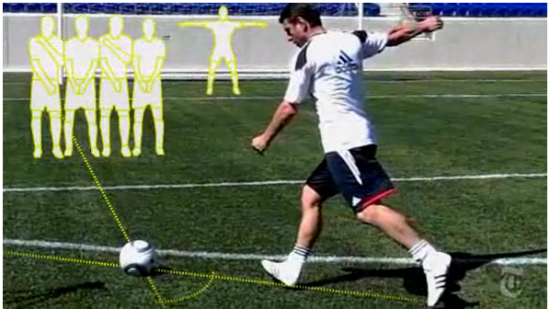This is fun.
https://www.youtube.com/watch?v=XICoCI20o-E
This is fun.
https://www.youtube.com/watch?v=XICoCI20o-E
The North Korean football team started the World Cup on such a high note – going down 2-1 to Brazil – that the nation’s cultural apparatchiks decided it would be good for moral if the next game was televised live. North Korean history in the making… but things didn’t go quite to plan. The North Koreans fought valiantly in the first half – but then Portugal put their feet to the North Korean team’s throat – and smashed them 7-0. This was unacceptable. And made Kim Jong Il feel very ronery.
It turns out, by the way, that the North Korean fans who made their way to South Africa were in fact Chinese ring-ins who were paid to be there.
When these players, and their poor coach (who became the fall-guy during the tournament, as players were instructed to blame him for the results – I guess the North Korean administration learned something from the English, Argentinians and most importantly – the French).
Since returning to the Peoples’ Republic of Korea the players and coach have been put through a rigorous process of public shaming at the hands of the nation’s administration. The coach copped the worst of it:
“The team’s coach, Kim Jong-hun, was reportedly forced to become a builder and has been expelled from the Workers’ Party of Korea.
The coach was punished for “betraying” Kim Jong-un – one of Supreme Leader Kim Jong-il’s sons and heir apparent.”
Ahh, the post World Cup low. I didn’t think it’d come so quickly, but now I’m wondering what I’m going to do with 4am. We’ve only recently become acquainted. Alas, I think our relationship will be brief.
Here are some World Cup odds and ends to help you overcome your fixation.
Starting with an analysis of the metaphysics of the World Cup from Overthinking It – Overthinking It is, without doubt, one of my favourite blogs. Other good recent posts include overthinking the problem of Mortal Kombat’s fusion of fantasy and verisimilitude (a form of plausibility),1 and a novel solution to the BP oil spill – namely the use of a band of merry men epitomised by the A-Team to clean up the spill.2 They also suggested the producers of Burn Notice might be criminally negligent or indeed open to prosecution under anti-terrorism laws. Here’s a quote from the World Cup post about England’s unfortunate goal line decision:
“The real world does not have official review. Even if we can determine the exact causes of a misfortune, we cannot rewind time to unmake it. All we can do is grit our teeth and try harder next time. But a sport — like any game — is a fenced-off version of how we’d like the world to be. It’s the World Plus Rules for Fairness. The arrow of time has less hold in the world of sport. We have the power to wind back the clock.”
If that’s not filling a World Cup void for you how about this video of Lego players reproducing the highlights of the round one clash between England and the USA?
Or this commemorative poster featuring all the nations from this year’s cup in the shape of the real star of the tournament – the Vuvuzela.

Or indeed, pre-order your copy of the best game spin off from the tournament.

Or you could be inspired by Remi Gaillard and drum up a gang of supporters to crash your local league game, turning it into the World Cup Final you wish you’d had this time around (H/T Tim).
It’s been a while since Argentina was knocked out – but if you’re a lady type hankering for some Maradona action (lets face it, he was one of the stars of this World Cup as demonstrated by this photo (h/t Dave Miers, from Boston.com))…

… you’ll be happy to know that Diego Maradona is most definitely not gay.
Perhaps you’re an aspiring player. If that’s the case there are two things you can do ahead of the next World Cup – sign me up as your agent/publicist and check out the mechanics of the perfect freekick (from FlowingData).

Also, check out this piece on why the pressure involved in taking a penalty kick may cause a player to choke (metaphorically of course).
“The “Yerkes-Dodson Law” predicts that participants in a penalty shootout should buckle under pressure. According to the theory, human performance follows an “inverted U shape.” Under the effect of mild stress, or “arousal,” proficiency improves as the subject expends more concentration and energy. But past a certain point, too much pressure leads to panic and attention problems, and choking ensues.”
Or, you could fill that gap by reading St. Eutychus.
1It’s a cool word, worthy of its own post, but I’ll footnote it in this one with Overthinking Its definition: To say something is “realistic” — a loaded word in itself — means that it could have come from real life. To say something has verisimilitude means that it appears that it could have come from real life. An explanation does not need to be plausible, but it needs to sound plausible, for it to have verisimilitude. It needs to stand up to casual regard, if not a concerted investigation.
Example: “Superman can fly” is fantastic. “Superman came from a planet with much higher gravity, so he can jump so far that it appears he can fly” has verisimilitude.
2 Such a team would traditionally feature: “individuals who fit into one of five types: Mastermind, Grifter, Hitter, Hacker, and Thief.”
It turns out world cup success does not depend on the ability of the players a team fields – but rather the presence of a particular parasite within their home country. This parasite, Toxoplasma Gondii (which sounds like the name of a footballer), may influence the natural dopamine levels of those infected. This diagram (from wikipedia) shows its life cycle, though it omits the bit where it helps win a World Cup for its host.

From Slate:
If we set aside the qualifying rounds (in which teams can play to a draw) and focus on matches with a clear winner, the results are very compelling. In the knockout round of this year’s tournament, eight out of eight winners so far have been the teams whose countries had higher rates of Toxo infection. If we go back to the 2006 World Cup, seven out of eight knockout-round winners could be predicted by higher Toxo rates. The one exception to the rule was Brazil’s defeat of Ghana, a match between two nations that each have very high rates. (Aside from having the winningest team in World Cup history, Brazil has quite a few cases of Toxo: Two out of three Brazilians are infected.)
It gets better. Rank the top 25 FIFA team countries by Toxo rate and you get, in order from the top: Brazil (67 percent), Argentina (52 percent), France (45 percent), Spain (44 percent), and Germany (43 percent). Collectively, these are the teams responsible for eight of the last 10 World Cup overall winners. Spain, the only one of the group never to have won a cup, is no subpar outlier—the Spaniards have the most World Cup victories of any perpetual runner-up. “
Coincidence? Perhaps. But I wish I’d read this before tipping a World Cup winner.
Have you seen Nike’s “Write the Future” advert during the World Cup? It was brilliant. A viral masterpiece. It was everything Adidas’ involvement with the World Cup was not (they made the Jabulani ball) – popular, successful, brand-building. And then this curse struck. Every player in the ad campaign has been bundled out, somewhat unceremoniously. Even Roger Federer, who made a cameo in the ad, was knocked out of Wimbledon prematurely.
“Because Write the Future was so well-executed, and because it became so popular so quickly, it effectively functioned as an inspiring prelude to the kickoff. And when that decisive moment came for Rooney (or Ronaldo, Ribéry, Cannavaro, et al) and they crumpled exactly as they had done in Nike’s vision, the entire meaning of the ad shifted away from “just do it” and toward a prognostication of doom.”
From Slate.
Maybe this is what got Tiger Woods.
James Morrison, on Santos, Sam and Ed the other night, said the Vuvuzela actually pitches somewhere between a and b flat. Just in case you were wondering… he played a vuvuzelaphone on the night – basically a set of vuvuzela pan-pipes. It was clever. So is this video.
This is the latest YouTube Tuesday ever… “bvvvrrrr” is the noise I reckon the Vuvuzela makes. It has no vowels. This video is funny.
Via Tim’s blog.
The World Cup has been producing ample fodder for one of my favourite games (which is probably pretty frustrating for other people) I like to call it “hey that guy looks like…”
Here’s an example. The Dutch manager Bert Van Marwijk looks almost exactly like former WWE wrestler Ric Flair…




In unrelated television – Master Chef regular Neil Perry looks exactly like Steven Seagal.

Especially when the latter plays a chef in Under Siege:

Here are Neil Perry’s knife skills on display (in text form) from a Q&A on taste.com.au:
“I love the way you cook and no matter how I try I can’t chop herbs fast or very fine without cutting my fingers. Can you give me some tips on how to chop as well as you do?”
The main thing to remember is to use a slicing action with your knife as opposed to a chopping action. By this, I mean keep the tip of the knife firmly glued to the board and cut/slice in flowing movements. Also, keep your finger tips tucked out of the way at all times. Use the middle knuckle of your fingers as a guide for your knife to lean against and make sure that any part of your fingers below that knuckle are tucked in.
And here, for your viewing pleasure (though it’s probably M rated) are Steven Seagal’s knife skills on display.
And, in a bizarre twist, St-Eutychus has a world exclusive linking the two men, and perhaps establishing that they are in fact the same person…
Neil Perry is the leading Australian endorser of a Japanese brand of knives called Shun knives. Shun knives are made by the Kai Corporation, who in America trade as Kershaw Knives, who just happen to be the manufacturers of the knife Steven Seagal designed.

That’s right. Same knife company. Same hairstyle. Same face. Same Asian flavour. Same person… you be the judge…

Do you have any World Cup lookalikes for me?
If, like me, you’ve been up late at night watching the World Cup and you’re finding it hard to adjust to life without the drone of the vuvuzela – then I have a solution for you. Use this site as the gateway for your browsing and you can add the monotonous (in b flat) buzz of the Vuvuzela to any web page.
Here’s St Eutychus with Vuvuzela.

Ahh, the Vuvuzela. What a profound choice to be the symbol of this World Cup. When we forget the teams that come 2nd to 32nd we will remember them. Their atonal sound (or b-flat tonal apparently – my wife used her iPhone piano to figure it out, and wikipedia confirms it)drowns out every other memory I have of any on field action in the six games I’ve watched so far.
The wikipedia article is in the throes of comedic vandalism as fans turn to the web to vent. Here’s what was in the description when I visited a few minutes ago:
“Vuvuzelas have been controversial.[1] They have been associated with permanent noise-induced hearing loss,[2] cited as a possible safety risk when spectators cannot hear evacuation announcements,[3] and potentially spread colds and flu viruses on a greater scale than coughing or shouting.[4][5] Commentators have described the sound as “annoying” and “satanic” [6] and compared it with “a stampede of noisy elephants,”[7] “a deafening swarm of locusts,”[8] “a goat on the way to slaughter”[9] and “a giant hive full of very angry bees.”[10].
The sound level of the instrument has been measured at 127 decibels[11][2] contributing to football matches with dangerously high sound pressure levels for unprotected ears.[12] A new model, however, announced on 14 June 2010, has a modified mouthpiece which is claimed to reduce the volume by 20 dB(A).[11]”
Here is an excerpt of Wikipedia’s description of their sound:
“BBBBBBBZZZZZZZZZZZZZZZZZZ ZZZZZZZZZZZZZZZZZZZZZ ZZZZZZZZZZZZZZZZZZZZZZZZZZZZZZ ZZZZZZZZZZZZZZZZZZZZ ZZZZZZZZZZZZZZZZZZZ ZZZZZZZZZZZZZZZZ ZZZZZZZZZZZZZZZZZZZZZZZZ ZZZZZZZZZZZZZZZ”
Some culturally sensitive numbskulls are suggesting that the Vuvuzela is a cultural icon. It’s not. There’s nothing uniquely South African about an annoying plastic trumpet that only plays one note. It’s not old enough to constitute “culture.” Claiming that the Vuvuzela is the epitome of South African culture is the equivalent of claiming Justin Bieber as the pinnacle of US music.
But look out – the vuvuzela has been given out to so many people free of charge that it’s probably going to be making its way back to your home country, where it may invade your favourite sport. If I were Australian Customs I’d be adding them to the dangerous goods list…
What Australia needs for its 2022 World Cup bid is an iconic national instrument that barely anybody plays, that requires little effort to pick up, and that would make an annoying noise if played en masse. I propose the wobble board. It’s cheap, readily adaptable for commercial purposes, and has an element of cultural cringeworthiness attached to it. Rolf Harris could be the face of our bid.

That’s culture.

It’s even in our national museum. It’s not some fly-by-night pretender to the cultural crown.

Ben is considering jumping on the World Cup bandwagon. I thought I’d lend a brother a hand with my guide to enjoying the World Cup. I’ve played a fair bit of football in my time, and watched as much, and played video games (including the boring ones where you manage a team). So I consider myself an expert. I was once almost a sports journalist too… if that counts.
So here’s what you’ll need to do (please note, several of these can be easily faked in order to convince your colleagues that you’re into the World Cup).
The ten teams I think might have a chance of winning (in no particular order)
Don’t back England. They never win. They show such promise, and then are rubbish. Players have brain explosions and get sent off, their strikers forget how to shoot, Murphy’s law applies to England in World Cups.
Ahh. Sport. Home to such brilliant examples of myopic legalism…
Did you hear the one about the guy who pitched a perfect game on Wednesday (US time) – except that an umpire missed a pretty obvious out on his final play, calling the batter safe and crushing the dreams of the young pitcher? No. Well, the Major League Baseball administrators had to consider whether or not to overturn the decision giving this kid an achievement as rare as hen’s teeth (there have been 21 in history – but three in the last month), and they decided not to. Check out the story.
But better than that… The World Cup comes around once every four years. It’s the biggest event in sport (despite what the Olympic PR machine might say). North Korea (who probably should have known better), decided that the arbitrary three goalkeepers in a squad of twenty-three was excessive. So they named two, and picked a young striker to double as a goalkeeper, in the unlikely event that his presence between the sticks was required.
The catch is, that this player must play in goals. I didn’t know that was a rule. I thought goalkeepers could swap upon notifying the referee… but a 27 year old from a nation that isn’t a guaranteed qualifier for any future World Cup, ever, has had his dreams have been crushed by sporting administrators applying the letter, not the spirit, of the law. Brilliant. Here’s hoping the other two keepers get injured forcing him to make a stirring, Hollywood style debut between the sticks, only to win the World Cup for Korea. Then, in the celebrations, Kim Jong Il will adopt him as his heir. It could happen…
I can’t get enough of those “how stuff get made” videos. The World Cup is this year. Here’s how they make the balls.